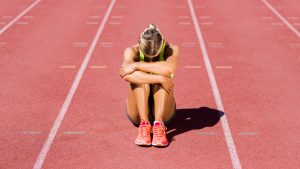Over the years, I have been fortunate to work with lots of athletes ranging from youth to professionals. Regardless of age or skill level, I have observed that each one approaches the recovery in their own way. Some are eager to tackle therapy, while others are apprehensive and fearful.

To be clear, the mindset of the patient is as important, if not more important than the physical part of the process as it relates to success. With ACL rehab, I pay close attention at post-op visit number one to determine if the patient is a coper, non-coper or somewhere in between. Having this awareness is crucial as I look to encourage the client and position him/her for success in the fist phase of rehab. The mindset of a patient recovering from their second or third ACL tear may differ greatly than that of a first timer.
With that said, assessing the state of mind of any athlete in the PT clinic is a must. An athlete’s identity, confidence and self-worth is often tied to his/her sport. Injuries separate the athletes from their teams and take away something very important to them. This can lead to depression, anxiety, anger, fear and loneliness to name a few.
It is imperative to connect with an athlete in the first 1-2 visits of rehab. I aim to bond with them and ensure they know I will do everything in my power to get them back to their prior level of performance. Fear of loss is powerful, and I want to partner with them to prevent the loss of playing time as quickly and safely I can though proper rehab.
Some injuries are worse than others, but athletes suffering their first major injury often have doubts and fears related to getting back to 100%. While I took psychology on college, I have spent additional time studying how the mind can impact the body. A few resources in my library that I think are valuable in helping me relate and motivate my clients are:
Mind Gym by Gary Mack
Relentless by Tim Grover
How Successful People Think by John Maxwell
One of my favorite statements from this Maxwell book is: “What we think determines who we are. Who we are determines what we do.” As clinicians we must think positively and infuse this positivity into our clientele. We need to cultivate positive energy and momentum as they work hard to restore their premorbid functional level.
As therapists, strength coaches, trainers or anyone working with athletes, we must invest in our knowledge and understanding of how best to motivate and train these individuals. Harnessing the power of the mind is essential. Learning how to recognize their emotional needs and weaknesses will help us better connect with them and get them to the finish line faster. We must be able to spot the mental limitations as well as the physical ones.
In rehab, I have been using specific outcome tools to assess readiness to return to sport in my patients recovering form ACL surgery. Currently, I assess the TSK-11 (shortened version of the Tamp Scale for Kinesiophobia). I gather input on this at weeks 6, 12, 18 and at discharge to track changes and where they score. Click here for more information on this scale.
I also routinely use the ACL-RSI. I have an app on my phone for the tool, and it takes about 1 minute or so for patients to do. Both of these tools provide valuable insight about the mindset of patients with respect to their recovery and any fear of re-injury.
It should be our goal to restore mental and physical capacity for the athlete, otherwise they are more likely to suffer re-injury or deliver a substandard performance. Sometimes we need to put on the brakes for fearless or aggressive athletes. Other times, it is necessary to gently nudge or even push patients who are hesitant or fearful of moving forward.
Giving an athlete the green light prior to hitting the mark for mental and physical competency is a mistake we must avoid. Parents, coaches and peers present many voices, but the rehab professional needs to be the one the athlete hears and trusts the most. To be this voice, we must be able to recognize signs and symptoms of mental weakness/fatigue and measure fear of re-injury along the way. Then, we must provide the best blueprint for the individual based on his/her injury, capacity and goals.
Below are a few articles regarding athletes and returning to sport after ACL injuries:
Whether you are a provider, parent, coach or athlete, I hope this post is helpful. My intention in writing it is to shed light on the importance of the MIND as it relates to regaining physical prowess and high performance following an injury.

